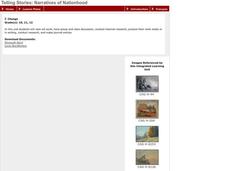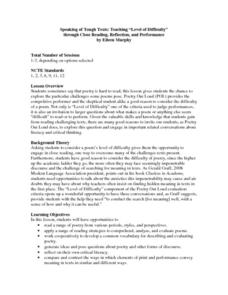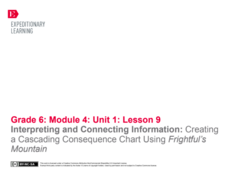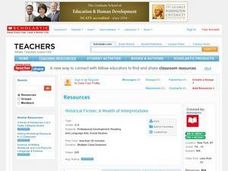Curated OER
How To Interpret a Document
In this history worksheet, students will learn how to interpret a historical document by completing a web with information about the document and it's audience and purpose.
Curated OER
Interpreting a Quote by Helen Keller
In this quote interpretation worksheet, students read a quote by Helen Keller that is show at the top of the page along with her picture. They write an essay explaining the meaning of the quote.
Curated OER
Famous Quote Interpretation
In this quote interpretation instructional activity, learners use critical thinking skills to respond to a question regarding a passage by Ralph Waldo Emerson.
Curated OER
Interpreting Characters, Setting, Plot, and Theme - The Triangle Shirtwaist Factory Disaster
Examine story development and historical disaster with your class. Learners view a video depicting the incidents surrounding The Triangle Shirtwaist Disaster. They use graphic organizers and the Internet to gather enough information to...
Curated OER
From Quotation to Interpretation in Informational Texts
How to ignite thoughtful written responses with the words of philosophers, artists, and current events.
Curated OER
Change
Here is a series of four lessons which invite high schoolers to experience how to interpret the meaning(s) of a painting. They discuss how paintings can reflect the way things change over time, and that leads to a discussion on the...
Curated OER
Poems: "The Rabbit"
In pairs or on their own, fourth graders read the poem, "The Rabbit." They then answer eight critical-analysis questions, requiring them to make inferences, and interpret the poem's meaning and use of language. The reading passage,...
Curated OER
Teaching “Level of Difficulty” through Close Reading, Reflection, and Performance
What makes a poem difficult? Explore that topic and more with your class as you work through the lesson plan detailed here. Using materials from Poetry Out Loud, a national recitation contest, individuals or small groups examine poems...
Curated OER
Interpreting Paleoenvironments With Microfossils
Students gain a better understanding of how scientists can use foraminifera to interpret past environments. Specifically, students have the opportunity to explain one of the basic tenets of geology - the present is the key to the past.
Curated OER
Writing an Interpretive Essay to Describe a Theme - The Red Shoes
Students explore the concept of literature themes. For this theme lesson, students watch a video segment of "The Red Shoes." Students discuss the author's message regarding friendship and then write a friendship essay.
Roald Dahl
Matilda - Miss Honey and The Trunchbull
As the instructor reads aloud several quotes from five chapters of the story Matilda, class members mime their interpretation of the scenes. Then, after reading "Miss Honey" and "The Trenchbull" (chapters seven and eight), the class...
August House
Go to Sleep, Gecko
Use this multidisciplinary lesson to delve into these subjects: English language arts, math, science, drama, and character education. After reading, discussing, and making interpretations about Go To Sleep, Gecko!: A Balinese Folktale by...
August House
The Hidden Feast
What is a proverb? This is the leading question of this resource. First, explore proverbs and their meanings. Then, read aloud The Hidden Feast: A Folktale from the American South by Martha Hamilton and Mitch Weiss and partake in a grand...
National Endowment for the Humanities
“Every Day We Get More Illegal” by Juan Felipe Herrera
A study of Jan Felipe Herrera's poem "Every Day We Get More Illegal" opens the door for a discussion on immigration. To begin, class members examine the photograph "Desert Survival," record their observations of the image, and then...
Curated OER
Figurative Language in Toni Morrison's "A Mercy"
In order to read and respond to Toni Morrison's A Mercy in this figurative-language lesson, young scholars discuss the differences between a literal and a figurative interpretation of a text. They explore figures of speech using a...
Curated OER
Literature Review
Here's a great game that will help your class review a book or unit before an exam. Three pupils act as judges while two teams take turns responding to your knowledge, interpretation, and judgement questions. Complete directions for the...
Curated OER
Calling All Directors
Interpret Shakespearian scenes with your middle and high school classes. Groups select scenes from plays that they are familiar with to perform for their classmates. They should attempt to recreate the emotions they think the characters...
profitt.gatech.edu
Effective Communication: Listening, Speaking, Writing, Interpreting
Help young learners become active listeners and strong public speakers with a set of activities that range from paraphrasing, to discussions, and self-reflection. Additionally, the lessons address social media skills and non-verbal...
EngageNY
Interpreting and Connecting Information: Creating a Cascading Consequence Chart Using Frightful’s Mountain
Decisions, decisions. Scholars take a close look at making decisions by discussing the character Sam in chapters one through eight of Frightful’s Mountain. Partners discuss whether Sam should interact with Frightful and then complete a...
Soft Schools
Interpreting Metaphors in Shakespeare
"All the world's a stage, and all the men and women merely players." Shakespeare provides the examples on this worksheet that asks readers to identify the two things being compared and to explain the characteristics the two share.
Great Books Foundation
I Shall Not Beg for My Rights
An excerpt from Henry MacNeal Turner's address to the Georgia legislature provides class members with an opportunity to develop their literary analysis skills. Prompted by the provided factual, evaluative, and interpretive questions,...
Penguin Books
A Teacher's Guide to the Signet Classic Edition of William Shakespeare's Measure for Measure
Trying to get a hold on the author's intent in Measure for Measure can be a problem—no wonder the drama is considered one of Shakespeare's "problem" plays. This guide provides instructors with information about why the play is considered...
Curated OER
Historical Fiction: A Wealth of Interpretations
How can understanding the genre of historical fiction help your language arts class with literary analysis? Use this lesson to help young readers learn about historical fiction. After reading a selection from the "Dear America" or "My...
Education Oasis
Creative Writing Unit: Analyzing, Interpreting, Discussing and Writing Various Genres of African-American Literature
A six-week unit takes high schoolers through various works of African-American literature, including poems, plays, and short stories. The lesson plan format includes a week-by-week description of activities, goals, materials, and...
Other popular searches
- Interpreting Graphs
- Interpret Charts and Graphs
- Interpreting Remainders
- Reading Graphs
- Interpreting Weather Maps
- Graph Interpretation
- Interpret Weather Maps
- Interpreting Lyrics
- Interpret Box and Whisker
- Interpreting Bar Graphs
- Music Interpretation
- Interpreting Pie Charts

























